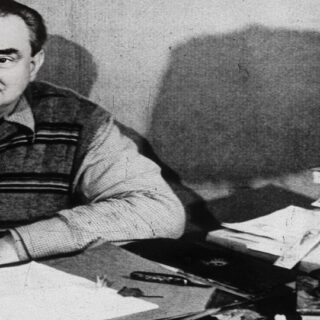
Many people would say that Dostoevsky’ short novel “Notes from Underground” marks the beginning of the modernist movement in literature.
Other candidates: Diderot’s “Rameau’s Nephew,” written in the seventeen-sixties but not widely read until the eighteen-twenties, and, of course, Flaubert’s “Madame Bovary,” from 1856. Certainly, Nietzsche’s writings, Freud’s theory of neurosis, Kafka’s “Metamorphosis,” Bellow’s “Herzog,” Philip Roth’s “Portnoy’s Complaint,” perhaps Scorsese’s “Taxi Driver,” and half of Woody Allen’s work wouldn’t have been the same without the existence of this ornery, unstable, unmanageable text—the fictional confession of a spiteful modern Hamlet, an inhabitant of St. Petersburg, “that most abstract and pre-meditated city,” and a man unable to act and also unable to stop humiliating himself and embarrassing others. A self-regarding, truculent, miserable, paralyzed man.
As I began reading “Notes” again recently (in Andrew R. MacAndrew’s translation for Signet Classics), I wondered if it had been overwhelmed by the books and movies that it has influenced. I wondered if “Notes” would seem like a dim echo, whether it still had the shock value that I remember from long ago.
Dostoevsky worked on the text in 1863 and published it the following year in Epoch, the magazine edited by his brother Mikhail. “Notes from Underground” feels like a warmup for the colossus that came next, “Crime and Punishment,” though, in certain key ways, it’s a more uncompromising book. What the two fictions share is a solitary, restless, irritable hero and a feeling for the feverish, crowded streets and dives of St. Petersburg—an atmosphere of careless improvidence, neglect, self-neglect, cruelty, even sordidness. It is the modern city in extremis. Dostoevsky himself had recently returned from exile, and his St. Petersburg life in this period was furtive and desperate.
The text itself purports to be the writings of a retired mid-level government bureaucrat. A family bequest has allowed him to quit his job, which he hated, and he is now forty, living with a servant whom he despises in what he calls “a mousehole.” In an introductory note, Dostoevsky explains that both the character and his “notes” are fictional, but that he represents a certain Russian type the public needs to know about. The underground man (the title, in Russian, literally means “notes from under the floorboards”) addresses an imaginary audience whom he refers to as “you” or “ladies and gentlemen”—presumably a representative group of educated, Westernized Russians.
He alternately teases, insults, and abases himself before them. They are people besotted, he believes, with Western ideas of progress—the ideologies of utilitarianism, socialism, evolution, the greatest good for the greatest number, and so on. They are also enamored of German idealism—”the good and the beautiful” of Schiller’s rhapsodic writing. Is the underground man Dostoevsky himself? No, but he spouts many of Dostoevsky’s ideas and antipathies; the book is certainly an appropriate introduction to Dostoevsky the Slavophile reactionary who emerged in his final years.
But “Notes” is a canny work of literature, not a tract: Dostoevsky may have put his own ideas into the mouth of a brilliant man, but he undermined him as a self-destructive mess at the same time. The text, as academics might say, is multivalent, at odds with itself. It’s not so much that the underground man’s opinions are wrong—surely Dostoevsky thought that many of them were true, however wildly phrased—but that they were inseparable, like all opinion, from personal strengths and weakness, even personal pathology.
We are inevitably subjective and self-justifying—that is one of the modern elements in the book. We are also entirely inconsistent. The underground man taunts his listeners, apologizes, criticizes himself, then gets aggressive, then collapses again. On and on. He pulls the rug out from underneath his own feet; he realizes he’s trapped in the prison of his own character. Hell is myself. No one would put up with this guy in his home for more than a half hour. He’s only possible—entertaining, funny, nasty—on the page.
In the first part of the novel, the underground man, after introducing himself, complains, in his ejaculatory, stop-and-start way, about the spectacular Crystal Palace built in London (this was back in 1851). He rails against everything that the building represents—industrial capitalism, scientific rationality, and any sort of predictive, mathematical model of human behavior. Could anything be more contemporary? You can easily imagine what Dostoevsky would make of modern sociology, psychology, advertising techniques, war games, polling of any sort. What’s wrong with such techniques, in both their cynical or ameliorative uses, was simply stated by Sartre, in 1945: “All materialist philosophies create man as an object, a stone.” The underground man says that, on the contrary, human beings are unfathomable, unknowable. Given the opportunity, they may deny, for themselves, the certainty that two and two makes four. Why? Because the mere right to deny the obvious may be more important than the benefit of sheepishly acknowledging it.
Predictors of human behavior, as the underground man says, generally assume we will act in our own best interests. But do we?
The same question might be asked today, when “rational-choice theory” is still a predictive model for economists and sociologists and many others. When working-class whites vote for Republican policies that will further reduce their economic power—are they voting in their best interests? What about wealthy liberals in favor of higher taxes on the rich? Do people making terrible life choices—say, poor women having children with unreliable men—act in their best interests? Do they calculate at all? What if our own interest, as we construe it, consists of refusing what others want of us? That motive can’t be measured. It can’t even be known, except by novelists like Dostoevsky. Reason is only one part of our temperament, the underground man says. Individualism as a value includes the right to screw yourself up.
Having given us a rant, the underground man offers experience. He shifts back sixteen years. He is twenty-four. He recounts some strange incidents from his social life. For years, he harbored a grievance against an officer who had casually picked him up and moved him out of the way in a tavern. The moment was nothing, but his resentment knew no bounds. In the same year, he invited himself to a dinner party thrown by old school classmates; they were unworthy, crass young men—he hated them all—but he still longed for their respect. In the event, the dinner party is a disaster for him; he makes a fool of himself, and he winds up at the end of the evening sleeping with a lonely prostitute in a brothel and then talking to her for hours. She is a smart, decent girl, in desperate straits, and he condescends to her, lectures her, fears her. Will she come to him at home, make a man out of him? He needs her a lot more than she needs him.
Bourgeois sentimentalist that I am, I wanted the two of them to save each other, even if only for a few years, but, if I wanted that to happen, I could not have been reading as carefully as I should have been.
The modern element in “Notes from Underground” is Dostoevsky’s exultation in human perversity. You can read this book as a meta-fiction about creating a voice, or as a case study, but you can’t escape reading it also as an accusation of human insufficiency rendered without the slightest trace of self-righteousness. If you begin by grieving for its hero, he upsets you with so much truth of our common nature that you wind up grieving for yourself — for your own insufficiency. “Notes” is still a modern book; it still can kick.





